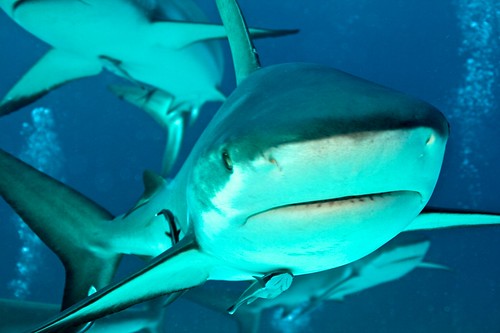The government of the Bahamas has taken strong measures to protect sharks in their waters. They have had a law in place for 20 years already, which banned longline fishing, to protect their marine resources but last year they put one on the books specifically to protect the more than 40 species of shark in the area. They have banned all commercial shark fishing as well as the sale, import or export of shark products. Following the example set by Palau, the Maldives, and Honduras which have all banned commercial shark fishing, the Bahamas recognized the need to protect one of its main tourist attractions. Recreational SCUBA divers spend over $80 million a year to dive with sharks in the Bahamas! Having worked in the dive industry in the Bahamas for 4 years in the mid 90’s, I can personally attest to the fact that she sharks are a big, big draw. We had divers visit from all over the world to experience and photograph the magnificent creatures.

The Odds Are In Our Favor
Sharks have always been vilified, the subject of horror movies and scary documentaries. We grow up believing that sharks spend their lives swimming through the ocean waiting for a human victim. After watching the movie, “JAWS” as a child, I had trouble swimming in the deep end of a swimming pool! The reality is that we are millions of times more likely to be killed by a part falling off an aircraft than by a shark. More people drown in the ocean every year than are bitten by a shark. The poor sharks however, are up against some heavy odds. It is estimated that between 25 and 75 million sharks are killed worldwide each year for their fins. It’s been almost impossible to stop the finning practice when the fins are worth about $300 a pound in Asian markets. As long as there is demand, there will always be a supply. Long before I learned to dive, I was a guest at a fancy restaurant in Vancouver and tasted sharkfin soup. I don’t remember it being special. I’ve also eaten turtle, alligator, rattlesnake and many other odd foods in my travels. I don’t endorse eating sharkfin, though I wouldn’t hesitate to eat fried thresher shark again, it was fantastic.
Prime Real Estate
Now that the sharks are protected, the next step is the preservation of the mangroves, the nurseries where so many species begin their lives. Mangroves are considered to be one of the most important and productive habitats on the planet. Researchers in Bimini have been studying lemon sharks for 25 years and found that the decline in numbers of sharks correlates back to the destruction of the mangrove nurseries.
Back in 2002, the Bahamas had plans in the works to create five preservation areas, including Bimini, but when the government changed, the project was back burnered. Now that officials have realized the value of sharks to their economy, perhaps they will reevaluate the preservation program. It is estimated that a single shark in a healthy habitat is worth up to $200,000 in tourism revenue over the course of its lifetime.
Jane Francis is a marine biologist and environmentalist who loves to inform people about issues facing the planet. She often spends time at island resorts to get close up looks at the state of ocean ecosystems in other nations.
Photo Credit: Stephen Bateman1
